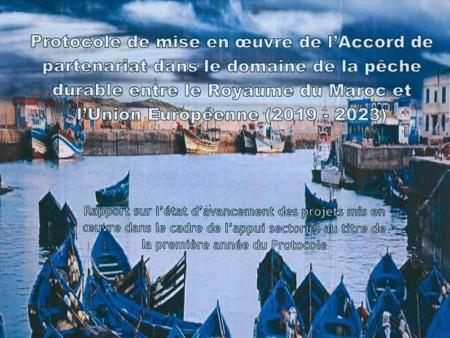EU’s Fishy Business with Morocco

Most of the EU`s financial support to Morocco under the EU-Morocco fisheries agreement has been spent on occupied land, new government report reveals. Western Sahara Resource Watch (WSRW) has obtained a recent report written by the Moroccan government, documenting how it has spent money that it has received from the EU as part of its current fisheries partnership agreement. Here is what it tells.
Background
The EU-Morocco Sustainable Fisheries Partnership Agreement (SFPA) entered into force on 18 July 2019. It is implemented through a Protocol, detailing the technical aspects to the agreement for a period of four years. The current Protocol thus runs until 17 July 2023.
In return for the opportunity to fish in the Moroccan ‘fishing zone’, the EU has agreed to remunerate Morocco on an annual basis, with the added condition that Morocco is to annually report on how it spent that money.
In December 2016, the Court of Justice of the European Union ruled that since Western Sahara has a separate and distinct status to Morocco, no EU Trade or Association Agreement with Morocco can be applied to the territory. The only way for any such agreement to lawfully affect Western Sahara, is through obtaining the explicit consent of the people of the territory. In 2018, the Court struck down the application of the EU-Morocco Fisheries Agreement in Western Sahara over the same reasons. But the EU ignored the Court`s rulings and opened negotiations with Morocco to modify both its trade deal and its fisheries agreement so that they will incorporate Western Sahara. The people of Western Sahara were not included in the entire process, and their objections to having their land included in the agreements were disregarded. Adding insult to injury, instead of trying to obtain the Saharawi people`s consent to continue, the EU Commission misled the Parliament and Council by presenting false claims on the Saharawi people`s opinions. The entire process has been documented in WSRW`s report Above the Law, published in December 2020.
The Findings
The Moroccan government report on project executed with aid derived from the EU Fisheries Agreement shows that the lion’s share of the EU`s funding from July 2019 to October 2020 was not spent in Morocco proper, but in the part of Western Sahara that Morocco holds under illegal military occupation. WSRW`s detailed analysis of the report reveals that out of €45,35 million given from the EU to Morocco, at least €35 million (over 77%) has been spent in occupied Western Sahara. It is certain, however, that the exact amount is even higher: several projects funded by the EU are carried out partly in Morocco and partly in Western Sahara, but the report provided by the Moroccan government does not allow to determine to what extent these split projects were carried out at which location. As such, Morocco is spending most of the money accrued through its fish deal with the EU on developing its fish sector and on infrastructure projects in a territory over which it has no legal title.
Not only do the people of Western Sahara object to having their land included - against their will - in the EU-Morocco fish deal. They`re not even reaping the potential benefits. Saharawis are traditionally not a fishing people. The fish sector in the territory was developed under the Spanish colonization and taken over by Morocco after its invasion in 1975. To date there are but few Saharawis employed in the fish sector. They have often protested against the exclusion and marginalization they face in the job market in favor of Moroccan settlers, despite the international criminal law prohibition of population transfer, including the implantation of settlers and settlements in occupied territory.
Cables by US diplomats leaked in 2010 revealed that the fishing industry in Western Sahara was controlled by generals of the Moroccan army. This was corroborated by independent Moroccan media, which in 2012 published a list of the principal possessors of fishing licenses.
The EU has funded Moroccan construction of storage spaces for fishermen in occupied Western Sahara, mostly used by Moroccan settlers. The photo is from Morocco`s expenditure report to the EU in relation to the Union`s 2019-2020 financial support.
Morocco`s report on its expenditure of EU funds illustrates the union`s diametrically opposite approach to the annexed territories of Palestine, Crimea and Western Sahara. The part of the funding going to the occupied territory seems even to have increased since the previous partnership agreement.
For the first operative year of the Protocol – from July 2019 to October 2020 (adding three months to accommodate for COVID19), €45,35 million was paid to Morocco. That money was not one single sum, but was divided across three categories: €19,1 million paid for access to fishing grounds, €8,7 million in fees paid by EU operators, and €17,55 million as support to develop Morocco’s fishing sector. WSRW research has revealed that Morocco spent most of the sectoral support (96%) on developing the fish sector in Western Sahara and practically all of the financial compensation for access on infrastructural projects in the occupied territory.
This article is based on the summary findings by WSRW. See the original article “Morocco spends most of EU`s fish support in occupied land” for more detail.
The Moroccan government report can be downloaded here.
Image on front page: Extract from the cover of the report. Source: WSRW. Image on this page: Chart indicating the distribution of EU Fisheries Agreement proceeds. Source: WSRW.
|